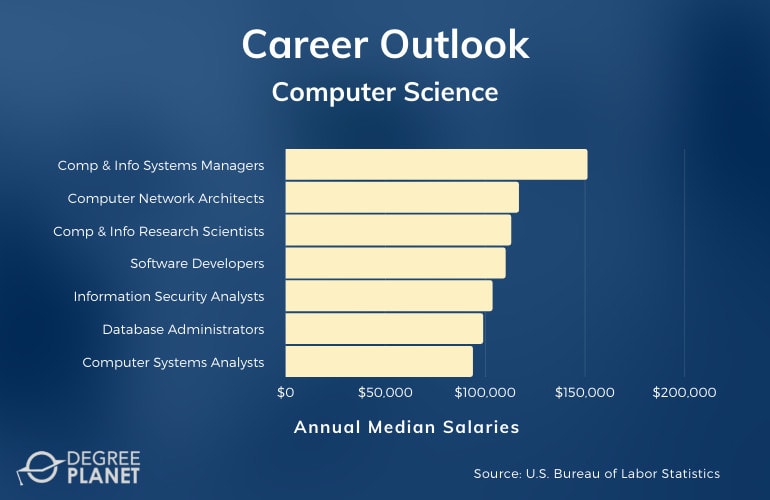What can you do with a computer science degree?

While some bachelor’s degree programs prepare you for specific careers, computer science is a broad field with a variety of potential real-world applications.
Editorial Listing ShortCode:
Keep reading to learn more about the many possible career paths in the field of computer science.
What Can You Do with a Computer Science Degree?

“So,” you may be asking, “what can I do with a computer science degree?” Well, the type of jobs you can pursue after graduation will depend on a number of factors, such as your specific qualifications, work experience, and degree focus.
There are many possible career options, though, for computer science majors. Some graduates go on to become software developers or programmers whose primary job responsibility is writing code. Others become user experience designers or researchers, observing how real humans interact with technology with the goal of making it as user-friendly as possible.
Those who work in cybersecurity help companies protect data from online hackers and security breaches. Some professionals work as computer or information technology support specialists, helping companies solve a variety of tech problems and ensuring that software is kept up-to-date.
Editorial Listing ShortCode:
Web developers and designers can help companies build and maintain beautiful and functional websites for their customers to order products or engage with their services. Because almost every modern industry uses technology, computer science roles are available at all kinds of businesses and organizations.
While some computer science graduates go on to work for major tech companies, others go on to work for small businesses. Computer science expertise is also needed in education, healthcare, and almost any other industry.
5 Things You Can Do with a Computer Science Major

Here are some specific examples of possible career options for professionals with computer science degrees. All of these careers make use of coding knowledge and related skills.
1. Computer Programmer
Computer programmers write code to make software applications run effectively. They are usually proficient in multiple programming languages, such as Python, C++, Java, and more. They can also check codes and fix mistakes.
Software-as-a-service, or SaaS, is one of the fastest-growing fields for computer programmers. SaaS applications are provided through the internet and do not need to be rewritten for different system platforms, which can save time for programmers.
2. Information Security Analyst

Information security analysts work to keep computer systems and networks safe. This is very important work for businesses and financial institutions who want to ensure that customers’ personal information is not stolen.
Information security analysts typically perform tasks like installing firewalls and data encryptions programs and investigating security breaches. They can also simulate attacks to look for vulnerabilities in current security measures and recommend security updates to management.
3. Web Developer or Digital Designer
Web developers and digital designers create and maintain websites, ensuring that websites are visually attractive and easy to use. This type of job can allow you to apply technological skills in a more artistic way than most other computer science careers.
Common employers of web developers and digital designers include computer systems design services, publishing industries, consulting services, and advertising services. In addition, many web developers are self-employed.
4. Computer Systems Analyst

The main goal of a computer systems analyst is to make an organization’s current computer systems more efficient.
They help make decisions about when to update an organization’s hardware and software, and they help configure and install upgrades as well as train employees on how to use them. They can also test systems to look for bugs and fix them as needed.
5. Computer Support Specialist
Computer support specialists help people solve problems with technological devices. Computer support specialists who work on site for a business or company are often available during office hours to fix computers, printers, and related technology and to assist employees.
Editorial Listing ShortCode:
Some computer support specialists work remotely or in call centers, walking callers through action steps to solve whatever problem they are having.
Computer Science Careers & Salaries

According to the Bureau of Labor Statistics, here are examples of common computer science careers, accompanied by their median annual salaries.
| Careers | Annual Median Salaries |
| Computer and Information Systems Managers | $159,010 |
| Computer Network Architects | $120,520 |
| Computer and Information Research Scientists — Federal Government, excluding postal service | $112,310 |
| Software Developers, Quality Assurance Analysts, and Testers | $110,140 |
| Information Security Analysts | $102,600 |
| Computer Systems Analysts |
$99,270 |
| Database Administrators and Architects | $98,860 |
| Computer Programmers | $93,000 |
| Network and Computer Systems Administrators | $80,600 |
| Web Developers and Digital Designers | $77,200 |
The median wage for computer and IT jobs overall is $97,430, which is higher than the median for all occupations (Bureau of Labor Statistics). This field is also in high demand, with the Bureau of Labor Statistics projecting 13% job growth for the computer and information technology sector over the next ten years.
Is Financial Aid Available?

Yes, there are many forms of financial aid available to students who qualify. Financial aid options can include state aid and federal aid, employer programs, and merit-based and need-based scholarships from your college or university.
Professional organizations can also have scholarships available for aspiring students of particular fields. To apply for federal financial aid, you can fill out the Free Application for Federal Student Aid (FAFSA). The FAFSA is often the first step to determining your eligibility for need-based assistance.
What Is Computer Science?
Computer Science (CS) is the study of how computers operate. It involves applying principles of math, science, and engineering to understand, improve, and utilize computers and computational systems.
The study of computer science involves learning about the processes that make computers run. A computer science program usually includes theoretical subjects like information theory and higher-level math. On the other hand, it also covers practical applications of these subjects, such as how to design and implement software.
Is Computer Science a Good Major?

Yes, computer science is a good major for many undergraduate students. A CS major provides a broad knowledge base that can prepare you for a variety of technological careers. Common positions in this field include computer network architect, computer programmer, information security analyst, and web developer and digital designer.
According to the Bureau of Labor Statistics, computer and information technology occupations as a group make a median annual salary of $97,430. Plus, employment for this occupation group is expected to grow by 13% over the next decade.
What Do You Learn in Computer Science?
At most colleges and universities, a computer science major provides a broad curriculum in which you can potentially study nearly anything related to how computers operate.
As a computer science major, you’ll likely study algorithms, information theory, discrete mathematics, and similar subjects that help you understand how computers organize and use data. You can also practice working with different programming languages, and you can learn about the process of developing websites and applications, including both front-end and back-end development.
Editorial Listing ShortCode:
In addition, you’ll likely participate in collaborative projects to learn not only technological skills but also how to plan timelines for projects and coordinate tasks among a group.
Is Computer Science Hard?

Whether computer science is a hard major is subjective. Most computer science programs do include some higher-level math, especially discrete mathematics.
Writing code for software applications often requires some creative problem-solving to get it to work correctly. Since computer science coursework can be time-consuming, it is usually helpful for aspiring CS students to have good time management skills.
For many students, degrees in computer science are challenging but doable. The subject of computer science is often well-suited to someone with an analytical mind who likes solving problems.
What Do Computer Scientists Do?

There are many specializations within computer and information technology that computer scientists can pursue.
For instance, computer systems analysts identify common computing problems experienced by workers in business, healthcare, or other fields, and they try to find solutions. Information security analysts are particularly on guard to prevent and respond to cyber attacks.
Some computer scientists conduct research and present their findings in academic journals or at conferences. Computer and information research scientists are often employed by the federal government, tech companies, or colleges and universities.
There are many computer science paths you can follow, depending on your interests and degree focus. Common CS areas include programming, web development, software development, and database administration. Most CS professionals are employed in computer systems design and related services.
How Much Does a Computer Scientist Make?

Computer scientists can earn a wide range of salaries. A salary can be dependent on a number of factors, such as your position, industry, degree focus, work experience, and employer.
According to the Bureau of Labor Statistics, computer and information research scientists in the federal government have a median salary of $113,490 per year. Meanwhile, computer systems analysts have a median salary of $99,270, and information security analysts earn a median of $102,600. On the other end of the spectrum, web developers and digital designers make a median of $77,200.
Overall, the median salary for computer and IT occupations is $97,430, which is much higher than the national average (Bureau of Labor Statistics). Some of the highest-paying industries for computer scientists include software publishers and computer systems design and related services.
What Jobs Can You Get with a Computer Science Degree?

There is a wide range of careers in computer science. What jobs you can qualify for as a comp sci major will depend on a variety of factors, including your geographic location, level of work experience, and degree focus.
Some common CS careers include software developer, computer programmer, and web developer. These jobs often involve a lot of coding and can be done on a freelance basis or as a traditional employee. Some professionals in the field also work as computer and information systems managers, information security analysts, database architects, and computer systems analysts.
What Can You Do with a Computer Science Degree Besides Programming?
Some possible computer science career options that do not involve lots of programming or coding include computer support specialist, UX designer, or information security analyst.
Computer support specialists usually help laypeople solve basic problems and complete computer tasks that do not involve any programming. User experience designers test computer applications. While they may give feedback to programmers about problems and whether the application is user-friendly, they do not do a lot of programming themselves.
Editorial Listing ShortCode:
Information security analysts apply knowledge of existing software to keep a company’s data secure, but they are seldom called upon to write new programs.
Some students choose to pursue a graduate degree in computer science. In fact, a growing number of universities offer programs leading to a masters in computer science with bachelor’s in an unrelated field.
Should I Major in Computer Science?

Whether you should major in computer science depends on your career goals and aspirations. If you love solving problems and working with technology, computer science might be a good match for you.
There are currently many jobs available related to computer science, and most of these jobs provide a median salary that’s above the national average. Of course, if you do not enjoy studying or working with computers, you might not be content over the long-term with a computer science degree, even if it leads to a job that pays well.
What’s the Difference Between Computer Engineering vs. Computer Science Bachelors Degree?
Here are some differences between computer engineering and computer science.
| Computer Science | Computer Engineering |
|
|
There can be some overlap in the coursework for each of these degrees.
What’s the Difference Between a BS in Computer Science vs. Information Technology?

Here are some differences between computer science (CS) and information technology (IT):
- Information technology: IT tends to focus on how to solve technological problems in business and the workplace. In an information technology degree program, you’ll learn more about how to troubleshoot existing technology.
- Computer science: CS tends to focus more on understanding the theory of how computers work. In a computer science degree program, you’ll learn more about how to create new software.
Computer science and information technology degree programs often feature similar coursework, and many computer and IT jobs can be performed by someone with either type of degree.
Is a Computer Science Degree Worth It?

Yes, a computer science degree is worth it for many students. This is a growing field with many possible job opportunities in nearly every industry. The Bureau of Labor Statistics currently projects 13% job growth for computer and IT occupations over the next decade, which is much faster than average.
Many careers in this field are expected to see even greater growth. For instance, employment of information security analysts is expected to grow by 33%, and employment of software developers is projected to grow by 22%. The field of computer science can also provide a fascinating challenge if you enjoy analytical problem-solving.
Getting Your Degree in Computer Science Online

In a computer science degree program, you can develop advanced knowledge of how computers work, and you can study software development, programming languages, and related skills.
This type of degree can prepare you for almost any career in the field of computers and information technology, depending on your focus and skill sets. If you have decided that a degree in computer science is the next step in your education, there are many options available for earning this type of degree. For example, a credible computer science degree online program could enable you to conveniently earn your degree from home.
You can start exploring accredited colleges and universities today to find the computer science program that’s right for you.

